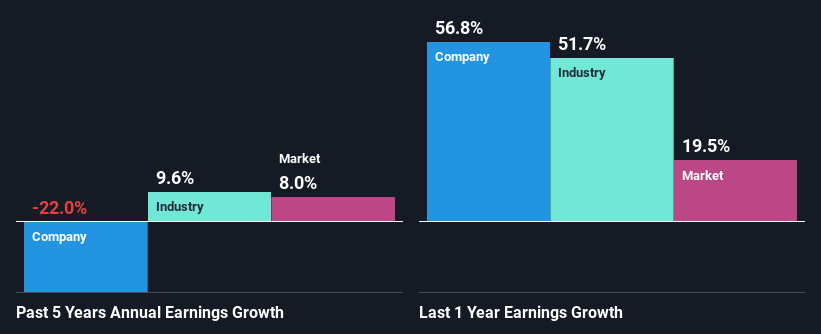Is Radius Residential Care Limited's (NZSE:RAD) Stock On A Downtrend As A Result Of Its Poor Financials?
Radius Residential Care (NZSE:RAD) has had a rough three months with its share price down 7.9%. To decide if this trend could continue, we decided to look at its weak fundamentals as they shape the long-term market trends. Specifically, we decided to study Radius Residential Care's ROE in this article.
Return on equity or ROE is a key measure used to assess how efficiently a company's management is utilizing the company's capital. In short, ROE shows the profit each dollar generates with respect to its shareholder investments.
See our latest analysis for Radius Residential Care
How To Calculate Return On Equity?
ROE can be calculated by using the formula:
Return on Equity = Net Profit (from continuing operations) ÷ Shareholders' Equity
So, based on the above formula, the ROE for Radius Residential Care is:
3.8% = NZ$2.7m ÷ NZ$70m (Based on the trailing twelve months to March 2022).
The 'return' is the amount earned after tax over the last twelve months. Another way to think of that is that for every NZ$1 worth of equity, the company was able to earn NZ$0.04 in profit.
Why Is ROE Important For Earnings Growth?
Thus far, we have learned that ROE measures how efficiently a company is generating its profits. Depending on how much of these profits the company reinvests or "retains", and how effectively it does so, we are then able to assess a company’s earnings growth potential. Generally speaking, other things being equal, firms with a high return on equity and profit retention, have a higher growth rate than firms that don’t share these attributes.
Radius Residential Care's Earnings Growth And 3.8% ROE
As you can see, Radius Residential Care's ROE looks pretty weak. Even when compared to the industry average of 15%, the ROE figure is pretty disappointing. Given the circumstances, the significant decline in net income by 22% seen by Radius Residential Care over the last five years is not surprising. We believe that there also might be other aspects that are negatively influencing the company's earnings prospects. For example, the business has allocated capital poorly, or that the company has a very high payout ratio.
So, as a next step, we compared Radius Residential Care's performance against the industry and were disappointed to discover that while the company has been shrinking its earnings, the industry has been growing its earnings at a rate of 9.6% in the same period.
The basis for attaching value to a company is, to a great extent, tied to its earnings growth. What investors need to determine next is if the expected earnings growth, or the lack of it, is already built into the share price. Doing so will help them establish if the stock's future looks promising or ominous. Has the market priced in the future outlook for RAD? You can find out in our latest intrinsic value infographic research report
Is Radius Residential Care Efficiently Re-investing Its Profits?
Radius Residential Care's very high three-year median payout ratio of 108% over the last three years suggests that the company is paying its shareholders more than what it is earning and this explains the company's shrinking earnings. Its usually very hard to sustain dividend payments that are higher than reported profits. Our risks dashboard should have the 6 risks we have identified for Radius Residential Care.
Only recently, Radius Residential Care stated paying a dividend. This likely means that the management might have concluded that its shareholders have a strong preference for dividends.
Conclusion
In total, we would have a hard think before deciding on any investment action concerning Radius Residential Care. The low ROE, combined with the fact that the company is paying out almost if not all, of its profits as dividends, has resulted in the lack or absence of growth in its earnings. Up till now, we've only made a short study of the company's growth data. You can do your own research on Radius Residential Care and see how it has performed in the past by looking at this FREE detailed graph of past earnings, revenue and cash flows.
Have feedback on this article? Concerned about the content? Get in touch with us directly. Alternatively, email editorial-team (at) simplywallst.com.
This article by Simply Wall St is general in nature. We provide commentary based on historical data and analyst forecasts only using an unbiased methodology and our articles are not intended to be financial advice. It does not constitute a recommendation to buy or sell any stock, and does not take account of your objectives, or your financial situation. We aim to bring you long-term focused analysis driven by fundamental data. Note that our analysis may not factor in the latest price-sensitive company announcements or qualitative material. Simply Wall St has no position in any stocks mentioned.
Join A Paid User Research Session
You’ll receive a US$30 Amazon Gift card for 1 hour of your time while helping us build better investing tools for the individual investors like yourself. Sign up here

 Yahoo Finance
Yahoo Finance 
